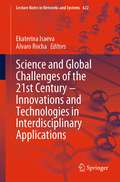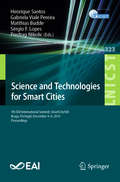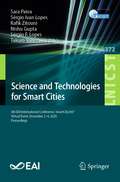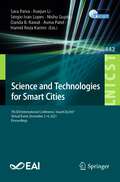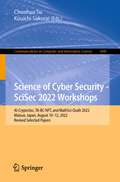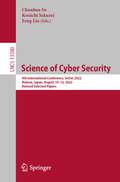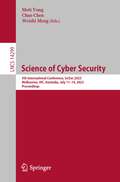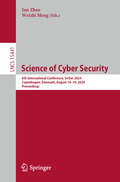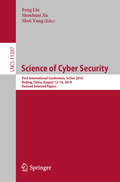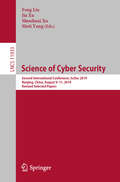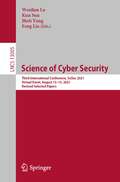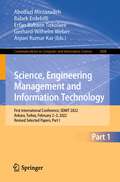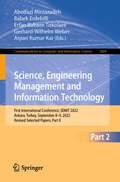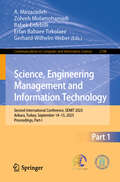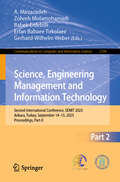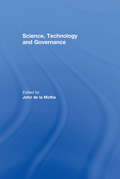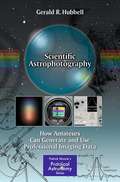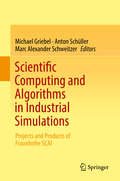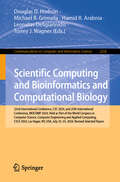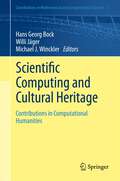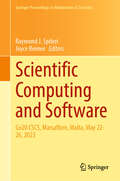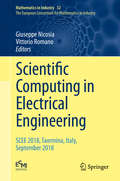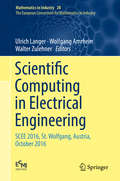- Table View
- List View
Science and Global Challenges of the 21st Century – Innovations and Technologies in Interdisciplinary Applications (Lecture Notes in Networks and Systems #622)
by Álvaro Rocha Ekaterina IsaevaThis book comprises proceedings of the 2022 International Forum “Science and Global Challenges of the XXI Century”. The main principle of the Forum’s program is interdisciplinarity, the formation of end-to-end innovation chains: fundamental and applied research, technology development, implementation, and wide application of networks and systems. In 2022, the central theme of the forum is innovations and technologies in interdisciplinary applications. The book covers a wide range of knowledge-communication methodologies and effective technologies for processing data in various forms and areas. The book might interest researchers working at the interface of disciplines, such as e-learning, digital humanities, computational linguistics, cognitive studies, GIS, digital geography, machine learning, and others. It can also be a valuable source of information for Bachelor and Master students with open curricula or majors and minors who seek to find a balance between several fields of their interest.
Science and Technologies for Smart Cities: 5th EAI International Summit, SmartCity360, Braga, Portugal, December 4-6, 2019, Proceedings (Lecture Notes of the Institute for Computer Sciences, Social Informatics and Telecommunications Engineering #323)
by Henrique Santos Gabriela Viale Pereira Matthias Budde Sérgio F. Lopes Predrag NikolicThis book constitutes the refereed proceedings of the 5th Annual Smart City 360° Summit, held in Braga, Portugal, in December 2019. The volume combines selected papers of four conferences, namely IoT in Urban Space, Urb-IoT 2019, Smart Governance for Sustainable Smart Cities, SmartGov 2019, Sensor Systems and Software, S-Cube 2019, and Intelligent Technologies for Interactive Entertainment, Intetain 2019. The 5 keynote and 32 conference papers presented were carefully reviewed and selected from 113 submissions and present results of multidisciplinary scientific and industry collaboration to solve complex societal, technological and economic problems Smart Cities. As such, the main goals are to promote quality of life, work conditions, mobility and sustainability.
Science and Technologies for Smart Cities: 6th EAI International Conference, SmartCity360°, Virtual Event, December 2-4, 2020, Proceedings (Lecture Notes of the Institute for Computer Sciences, Social Informatics and Telecommunications Engineering #372)
by Nishu Gupta Sara Paiva Rafik Zitouni Sérgio F. Lopes Sérgio Ivan Lopes Takuro YonezawaThis book constitutes the refereed proceedings of the 6th Annual Smart City 360° Summit. Due to COVID-19 pandemic the conference was held virtually. The volume combines selected papers of seven conferences, namely AISCOVID 2020 - International Conference on AI-assisted Solutions for COVID-19 and Biomedical Applications in Smart-Cities; EdgeIoT 2020 - International Conference on Intelligent Edge Processing in the IoT Era; IC4S 2020 - International Conference on Cognitive Computing and Cyber Physical Systems; CiCom 2020 - International Conference on Computational Intelligence and Communications; S-Cube 2020 - International Conference on Sensor Systems and Software; SmartGov 2020 - International Conference on Smart Governance for Sustainable Smart Cities; and finnally, the Urb-IOT 2020 -International Conference on IoT in Urban Space.
Science and Technologies for Smart Cities: 7th EAI International Conference, SmartCity360°, Virtual Event, December 2-4, 2021, Proceedings (Lecture Notes of the Institute for Computer Sciences, Social Informatics and Telecommunications Engineering #442)
by Nishu Gupta Danda B. Rawat Sara Paiva Hamid Reza Karimi Sérgio Ivan Lopes Xuejun Li Asma PatelThis book constitutes the refereed proceedings of the 7th Annual SmartCity360° Summit which was organized in November 2021 in Porto, Portugal. Due to COVID-19 pandemic the conference was held virtually. The volume combines selected papers of 6 conferences, namely EdgeIoT 2021 - International Conference on Intelligent Edge Processing in the IoT Era; IC4S 2021 - International Conference on Cognitive Computing and Cyber Physical Systems; SmartGov 2021 - International Conference on Smart Governance for Sustainable Smart Cities; SmartGift 2021 - International Conference on Smart Grid and Innovative Frontiers in Telecommunications; e PFSM 2021 - International Conference on Privacy and Forensics in Smart Mobility. The 45 full papers were carefully selected from 109 submissions. The papers are organized in four thematic sections on Smart Grid and Innovative Frontiers in Telecommunications; Smart Governance for Sustainable Smart Cities; Privacy and Forensics in Smart Mobility; and Sensor Systems and Software.
Science between Europe and Asia
by Feza Günergun Dhruv RainaThis book explores the various historical and cultural aspects of scientific, medical and technical exchanges that occurred between central Europe and Asia. A number of papers investigate the printing, gunpowder, guncasting, shipbuilding, metallurgical and drilling technologies while others deal with mapping techniques, the adoption of written calculation and mechanical clocks as well as the use of medical techniques such as pulse taking and electrotherapy. While human mobility played a significant role in the exchange of knowledge, translating European books into local languages helped the introduction of new knowledge in mathematical, physical and natural sciences from central Europe to its periphery and to the Middle East and Asian cultures. The book argues that the process of transmission of knowledge whether theoretical or practical was not a simple and one-way process from the donor to the receiver as it is often admitted, but a multi-dimensional and complex cultural process of selection and transformation where ancient scientific and local traditions and elements. The book explores the issue from a different geopolitical perspective, namely not focusing on a singular recipient and several points of distribution, namely the metropolitan centres of science, medicine, and technology, but on regions that are both recipients and distributors and provides new perspectives based on newly investigated material for historical studies on the cross scientific exchanges between different parts of the world.
Science of Cyber Security - SciSec 2022 Workshops: AI-CryptoSec, TA-BC-NFT, and MathSci-Qsafe 2022, Matsue, Japan, August 10–12, 2022, Revised Selected Papers (Communications in Computer and Information Science #1680)
by Chunhua Su Kouichi SakuraiThis volume constitutes the papers of several workshops which were held in conjunction with the 4th International Conference on Science of Cyber Security Workshops, SciSec 2022, held in Matsue, Japan, in August 10–12, 2022. The 15 revised full papers and 3 posters were presented in this book were carefully reviewed and selected from 30 submissions.They were organized in topical sections as follows: AI Crypto and Security Workshop (AI-CryptoSec); Theory and Application of Blockchain and NFT Workshop (TA-BC-NFT); and Mathematical Science of Quantum Safety and its Application Workshop (MathSci-Qsafe).
Science of Cyber Security: 4th International Conference, SciSec 2022, Matsue, Japan, August 10–12, 2022, Revised Selected Papers (Lecture Notes in Computer Science #13580)
by Feng Liu Chunhua Su Kouichi SakuraiThis book constitutes the proceedings of the 4th International Conference on Science of Cyber Security, SciSec 2022, held in Matsu, Japan in August 2022.The 36 full papers presented in this volume were carefully reviewed and selected from 88 submissions. The papers are organized in the following topical sections: blockchain and applications; cryptography and applications; network security; cyber-physical system; malware; mobile system security; system and web security; security in financial industry; social engineering and personalized security; privacy and anonymity.
Science of Cyber Security: 5th International Conference, SciSec 2023, Melbourne, VIC, Australia, July 11–14, 2023, Proceedings (Lecture Notes in Computer Science #14299)
by Moti Yung Chao Chen Weizhi MengThis book constitutes the refereed proceedings of the 5th International Conference on Science of Cyber Security, SciSec 2023, held in Melbourne, VIC, Australia, during July 11–14, 2023. The 21 full papers presented together with 6 short papers were carefully reviewed and selected from 60 submissions. The papers are organized in the topical sections named: ACDroid: Detecting Collusion Applications on Smart Devices; Almost Injective and Invertible Encodings for Jacobi Quartic Curves; Decompilation Based Deep Binary-Source Function Matching.
Science of Cyber Security: 6th International Conference, SciSec 2024, Copenhagen, Denmark, August 14–16, 2024, Proceedings (Lecture Notes in Computer Science #15441)
by Jun Zhao Weizhi MengThis book constitutes the refereed proceedings of the 6th International Conference on Science of Cyber Security, SciSec 2024, held in Copenhagen, Denmark, during August 14–16, 2024. The 25 full papers presented here were carefully selected and reviewed from 79 submissions. These papers focus on the recent research, trends and challenges in the emerging field of Cyber Security.
Science of Cyber Security: First International Conference, SciSec 2018, Beijing, China, August 12-14, 2018, Revised Selected Papers (Lecture Notes in Computer Science #11287)
by Feng Liu Moti Yung Shouhuai XuThis book constitutes the proceedings of the First International Conference on Science of Cyber Security, SciSec 2018, held in Beijing, China, in August 2018.The 11 full papers and 6 short papers presented in this volume were carefully reviewed and selected from 54 submissions. The papers focus on science of security; cybersecurity dynamics; attacks and defenses; network security; security metrics and measurements; and performance enhancements.
Science of Cyber Security: Second International Conference, SciSec 2019, Nanjing, China, August 9–11, 2019, Revised Selected Papers (Lecture Notes in Computer Science #11933)
by Feng Liu Moti Yung Shouhuai Xu Jia XuThis book constitutes the proceedings of the Second International Conference on Science of Cyber Security, SciSec 2019, held in Nanjing, China, in August 2019. The 20 full papers and 8 short papers presented in this volume were carefully reviewed and selected from 62 submissions. These papers cover the following subjects: Artificial Intelligence for Cybersecurity, Machine Learning for Cybersecurity, and Mechanisms for Solving Actual Cybersecurity Problems (e.g., Blockchain, Attack and Defense; Encryptions with Cybersecurity Applications).
Science of Cyber Security: Third International Conference, SciSec 2021, Virtual Event, August 13–15, 2021, Revised Selected Papers (Lecture Notes in Computer Science #13005)
by Feng Liu Moti Yung Kun Sun Wenlian LuThis book constitutes the proceedings of the Third International Conference on Science of Cyber Security, SciSec 2021, held in Shanghai, China, in August 2021.The 17 full papers and 5 short papers presented in this volume were carefully reviewed and selected from 50 submissions. These papers cover the following subjects: Cyber Security, Detection, Machine Learning and much more.
Science, Engineering Management and Information Technology: First International Conference, SEMIT 2022, Ankara, Turkey, February 2–3, 2022, Revised Selected Papers, Part I (Communications in Computer and Information Science #1808)
by Gerhard-Wilhelm Weber Arpan Kumar Kar Erfan Babaee Tirkolaee Abolfazl Mirzazadeh Babek ErdebilliThis two-volume set constitutes selected papers presented during the First First International Conference on Science, Engineering Management and Information Technology, SEMIT 2022, held virtually in Ankara, Turkey, in February 2–3, 2022 and in September 8-9, 2022. The 37 papers presented were carefully reviewed and selected from the 261 qualified submissions. The papers are organized in the following topical sections: application of computer science and technology in operations and supply chain management; advances of engineering technology and Artificial Intelligence in application management; human factors management systems based on information technology; technology-aided decision-making: systems, applications, and modern solutions.
Science, Engineering Management and Information Technology: First International Conference, SEMIT 2022, Ankara, Turkey, September 8-9, 2022, Revised Selected Papers, Part II (Communications in Computer and Information Science #1809)
by Gerhard-Wilhelm Weber Arpan Kumar Kar Erfan Babaee Tirkolaee Abolfazl Mirzazadeh Babek ErdebilliThis two-volume set constitutes selected papers presented during the First First International Conference on Science, Engineering Management and Information Technology, SEMIT 2022, held virtually in Ankara, Turkey, in February 2–3, 2022 and in September 8-9, 2022. The 37 papers presented were carefully reviewed and selected from the 261 qualified submissions. The papers are organized in the following topical sections: application of computer science and technology in operations and supply chain management; advances of engineering technology and Artificial Intelligence in application management; technology-aided decision-making: systems, applications, and modern solutions.
Science, Engineering Management and Information Technology: Second International Conference, SEMIT 2023, Ankara, Turkey, September 14–15, 2023, Proceedings, Part-I (Communications in Computer and Information Science #2198)
by Gerhard-Wilhelm Weber Zohreh Molamohamadi Erfan Babaee Tirkolaee Babek Erdebilli A. MirzazadehThis two-volume set constitutes selected papers presented during the Second International Conference on Science, Engineering Management and Information Technology, SEMIT 2023, held in Ankara, Turkey, during September 14–15, 2023. The 44 full papers and 2 short papers presented were carefully reviewed and selected from 409 submissions. The papers cover the following topics: Part I - Decision Analysis and Expert Systems; Machine Learning, Data Analysis and Computer Vision in Healthcare and Medicine; Smart Production, Transportation and Supply Chain Systems; Information Technology and Data Science in Industry. Part II - IoT, Blockchain, and Cyber Security in Complex Systems; Real-Time Data Analysis and Simulation in Engineering Systems; Digitalization and Artificial Intelligence in Manufacturing/ Service Industries; Soft Computing and Artificial Intelligence in Engineering Management and Marketing.
Science, Engineering Management and Information Technology: Second International Conference, SEMIT 2023, Ankara, Turkey, September 14–15, 2023, Proceedings, Part-II (Communications in Computer and Information Science #2199)
by Gerhard-Wilhelm Weber Zohreh Molamohamadi Erfan Babaee Tirkolaee Babek Erdebilli A. MirzazadehThis two-volume set constitutes selected papers presented during the Second International Conference on Science, Engineering Management and Information Technology, SEMIT 2023, held in Ankara, Turkey, during September 14–15, 2023. The 44 full papers and 2 short papers presented were carefully reviewed and selected from 409 submissions. The papers cover the following topics: Part I - Decision Analysis and Expert Systems; Machine Learning, Data Analysis and Computer Vision in Healthcare and Medicine; Smart Production, Transportation and Supply Chain Systems; Information Technology and Data Science in Industry. Part II - IoT, Blockchain, and Cyber Security in Complex Systems; Real-Time Data Analysis and Simulation in Engineering Systems; Digitalization and Artificial Intelligence in Manufacturing/ Service Industries; Soft Computing and Artificial Intelligence in Engineering Management and Marketing.
Science, Technology and Global Governance (Science And Technology In The Ipe Ser.)
by John R. De La MotheFirst published in 2001. Routledge is an imprint of Taylor & Francis, an informa company.
Science: Technology and Society Sourcebook
by Holt Rinehart Winston StaffScienceplus Sourcebook for High School
Scientific Astrophotography
by Gerald HubbellScientific Astrophotography is intended for those amateur astronomers who are looking for new challenges, once they have mastered visual observing and the basic imaging of various astronomical objects. It will also be a useful reference for scientifically inclined observers who want to learn the fundamentals of astrophotography with a firm emphasis on the discipline of scientific imaging. This books is not about making beautiful astronomical images; it is about recording astronomical images that are scientifically rigorous and from which accurate data can be extracted. This book is unique in that it gives readers the skills necessary for obtaining excellent images for scientific purposes in a concise and procedurally oriented manner. This not only gets the reader used to a disciplined approach to imaging to maximize quality, but also to maximize the success (and minimize the frustration!) inherent in the pursuit of astrophotography. The knowledge and skills imparted to the reader of this handbook also provide an excellent basis for "beautiful picture" astrophotography! There is a wealth of information in this book - a distillation of ideas and data presented by a diverse set of sources and based on the most recent techniques, equipment, and data available to the amateur astronomer. There are also numerous practical exercises. Scientific Astrophotography is perfect for any amateur astronomer who wants to go beyond just astrophotography and actually contribute to the science of astronomy.
Scientific Computing and Algorithms in Industrial Simulations
by Michael Griebel Marc Alexander Schweitzer Anton SchüllerThe contributions gathered here provide an overview of current research projects and selected software products of the Fraunhofer Institute for Algorithms and Scientific Computing SCAI. They show the wide range of challenges that scientific computing currently faces, the solutions it offers, and its important role in developing applications for industry. Given the exciting field of applied collaborative research and development it discusses, the book will appeal to scientists, practitioners, and students alike. The Fraunhofer Institute for Algorithms and Scientific Computing SCAI combines excellent research and application-oriented development to provide added value for our partners. SCAI develops numerical techniques, parallel algorithms and specialized software tools to support and optimize industrial simulations. Moreover, it implements custom software solutions for production and logistics, and offers calculations on high-performance computers. Its services and products are based on state-of-the-art methods from applied mathematics and information technology.
Scientific Computing and Bioinformatics and Computational Biology: 22nd International Conference, CSC 2024, and 25th International Conference, BIOCOMP 2024, Held as Part of the World Congress in Computer Science, Computer Engineering and Applied Computing, CSCE 2024, Las Vegas, NV, USA, July 22–25, 2024, Revised Selected Papers (Communications in Computer and Information Science #2258)
by Hamid R. Arabnia Leonidas Deligiannidis Michael R. Grimaila Douglas D. Hodson Torrey J. WagnerThis book constitutes the proceedings of the 22nd International Conference on Scientific Computing and Bioinformatics, CSC 2024, and the 25th International Conference on Computational Biology, BIOCOMP 2024, held as part of the 2024 World Congress in Computer Science, Computer Engineering and Applied Computing, in Las Vegas, USA, during July 22 to July 25, 2024. The proceedings include 25 papers from CSC 2024, which have been selected from a total of 128 submissions, and 27 papers from BIOCOMP 2024, that have been selected from 27 submissions. The papers have been organized in topical sections as follows: Military and defence modeling and simulation; scientific computing and applications; and bioinformatics and computational biology.
Scientific Computing and Cultural Heritage
by Willi Jäger Hans Georg Bock Michael J. WincklerThe sheer computing power of modern information technology is changing the face of research not just in science, technology and mathematics, but in humanities and cultural studies too. Recent decades have seen a major shift both in attitudes and deployment of computers, which are now vital and highly effective tools in disciplines where they were once viewed as elaborate typewriters. This revealing volume details the vast array of computing applications that researchers in the humanities now have recourse to, including the dissemination of scholarly information through virtual 'co-laboratories', data retrieval, and the modeling of complex processes that contribute to our natural and cultural heritage. One key area covered in this book is the versatility of computers in presenting images and graphics, which is transforming the analysis of data sets and archaeological reconstructions alike. The papers published here are grouped into three broad categories that cover mathematical and computational methods, research developments in information systems, and a detailed portrayal of ongoing work on documenting, restoring and presenting cultural monuments including the temples in Pompeii and the Banteay Chhmar temples of the Angkorian period in present-day Cambodia. Originally presented at a research workshop in Heidelberg, Germany, they reflect the rapidly developing identity of computational humanities as an interdisciplinary field in its own right, as well as demonstrating the breadth of perspectives in this young and vibrant research area.
Scientific Computing and Software: Go20 CSCS, Marsalforn, Malta, May 22-26, 2023 (Springer Proceedings in Mathematics & Statistics #495)
by Raymond J. Spiteri Joyce ReimerThese proceedings present a curated collection of innovative approaches to tackling challenging problems in applied mathematics. These problems, often marked by instability, inaccuracy, and high computational cost, remain at the forefront of mathematical research due to their difficulty. Addressing this demand, the contributions in this volume offer robust numerical methods designed to improve the accuracy and efficiency of their solutions. The book originates from the Go20 Conference 2023, where established experts and emerging researchers explored cutting-edge methodologies. The discussions captured here situate new advancements within a broader historical and theoretical context, providing a well-rounded perspective on these pressing mathematical challenges. Topics covered include: Ordinary Differential Equations (ODEs) with singularities Multi-dimensional and multi-rate systems of Partial Differential Equations (PDEs) High-index Differential-Algebraic Equations (DAEs) Inverse and optimal control problems This collection is a valuable resource for researchers and practitioners working on these or related topics. It offers comprehensive analyses and practical insights that bridge foundational principles with modern numerical innovations.
Scientific Computing in Electrical Engineering: SCEE 2018, Taormina, Italy, September 2018 (Mathematics in Industry #32)
by Giuseppe Nicosia Vittorio RomanoThis collection of selected papers presented at the 12th International Conference on Scientific Computing in Electrical Engineering, SCEE 2018, held in Taormina, Sicily, Italy, in September 2018, showcases the state of the art in SCEE.The aim of the SCEE 2018 conference was to bring together scientists from academia and industry, mathematicians, electrical engineers, computer scientists, and physicists, and to promote intensive discussions on industrially relevant mathematical problems, with an emphasis on the modeling and numerical simulation of electronic circuits and of electromagnetic fields. This extensive reference work is divided into five parts: Computational Electromagnetics, Device Modeling and Simulation, Circuit Simulation, Mathematical and Computational Methods, Model Order Reduction. Each part starts with a general introduction, followed by the respective contributions. The book will appeal to mathematicians and electrical engineers. Further, it introduces algorithm and program developers to recent advances in the other fields, while industry experts will be introduced to new programming tools and mathematical methods.
Scientific Computing in Electrical Engineering: Scee 2016, St. Wolfgang, Austria, October 2016 (Mathematics In Industry Ser. #28)
by Ulrich Langer Wolfgang Amrhein Walter ZulehnerThis collection of selected papers presented at the 11th International Conference on Scientific Computing in Electrical Engineering (SCEE), held in St. Wolfgang, Austria, in 2016, showcases the state of the art in SCEE. The aim of the SCEE 2016 conference was to bring together scientists from academia and industry, mathematicians, electrical engineers, computer scientists, and physicists, and to promote intensive discussions on industrially relevant mathematical problems, with an emphasis on the modeling and numerical simulation of electronic circuits and devices, electromagnetic fields, and coupled problems. The focus in methodology was on model order reduction and uncertainty quantification. This extensive reference work is divided into six parts: Computational Electromagnetics, Circuit and Device Modeling and Simulation, Coupled Problems and Multi‐Scale Approaches in Space and Time, Mathematical and Computational Methods Including Uncertainty Quantification, Model Order Reduction, and Industrial Applications. Each part starts with a general introduction, followed by the respective contributions. This book will appeal to mathematicians and electrical engineers. Further, it introduces algorithm and program developers to recent advances in the other fields, while industry experts will be introduced to new programming tools and mathematical methods.
